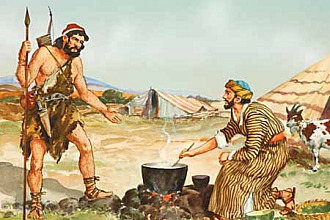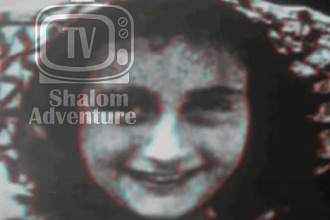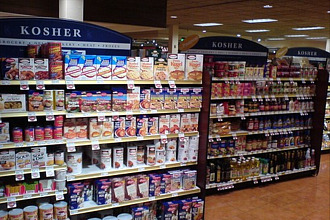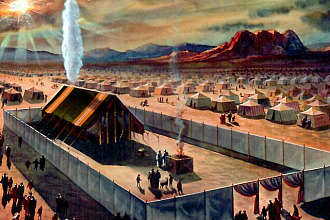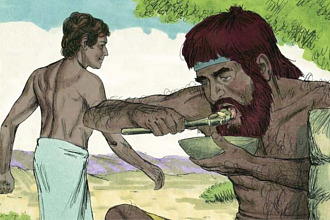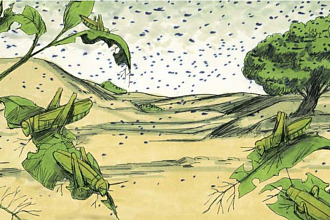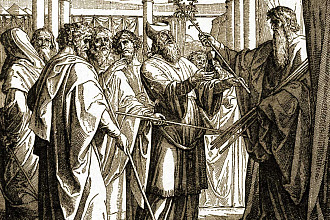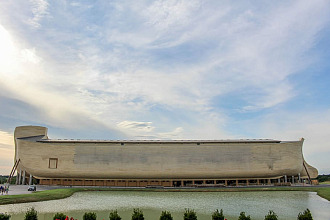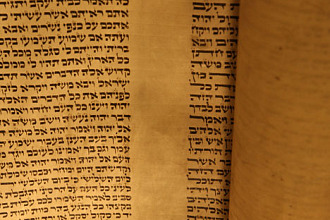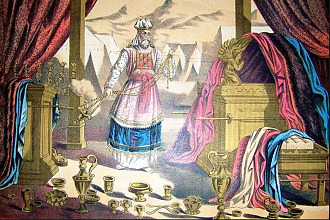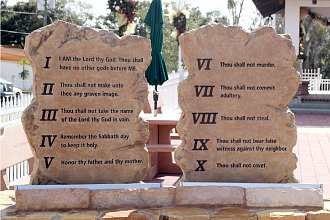Parasha for the Week: Baha’Alotcha Numbers 8:1 – 12:16
Haftara for the Week: Zechariah 2:14 – 4:7
Besorat Yeshua: Mark 4:21 – 34
Overview
Aharon is taught the method for kindling the menorah. Moshe sanctifies the levi’im to work in the Mishkan. They replace the first-born, who were disqualified after sinning at the golden calf. The levites are commanded that after five years of training they are to serve in the Mishkan from ages 30 to 50; afterwards they are to engage in less hard work.
One year after the Exodus from Egypt, G-d commands Moshe concerning the korban Pesach. Those ineligible for this offering request a remedy, and the mitzvah of Pesach Sheini, allowing to offer the korban Pesach one month later, is detailed.
Miraculous clouds that hover near the Mishkan signal when to travel and when to camp.
Two silver trumpets summon the princes or the entire nation for announcements. The trumpets also signal travel plans, war or festivals.
The order in which the tribes march is specified.
Moshe invites his father-in-law, Yitro, to join the Jewish People, but Yitro returns to Midian.
At the instigation of the eruv rav the mixed Egyptian multitude who joined the Jewish People in the Exodus some people complain about the manna.
Moshe protests that he is unable to govern the nation alone. G-d tells him to select 70 elders to assist him, and informs him that the people will be given meat until they will be sickened by it.
Two candidates for the group of elders prophesy beyond their mandate, foretelling that Yehoshua instead of Moshe will bring the people to Canaan. Some protest, including Yehoshua, but Moshe is pleased that others have become prophets.
G-d sends an incessant supply of quail for those who complained that they lacked meat. A plague punishes those who complained.
Miriam make a remark to Aharon about Moshe. G-d punishes Miriam with tzara’at, leprosy.
Moshe prays for her, and the nation waits until she is cured before traveling
"The Light of the Menorah"
This week’s Parasha, begins with G-d’s instructions to Aaron concerning the lighting of the Menorah. But, instead of using the word Lehadlik which means to “kindle,” the Torah uses the word Beha’alotcha which literally means to “elevate.” The Torah refers to the lights of the Holy Temple as Ner Tamid—a “perpetual light”. Although we do not have the Holy Temple, the synagogue is called a Mikdash Me’at a “miniature Temple”. In the synagogue we also have a Ner Tamid, a special light which burns at all times. Candles and light have an important symbolic role in the synagogue as well as in the Jewish home. One of their symbolic role is to remind us the Mitzvot (commandments), which are also likened to a candle, the Torah is compared to light; the Torah and mitzvot illuminate and enlighten ones surroundings and the world. At the marriage ceremony, many have the custom that the bride and groom are led to the Chupah (marriage canopy) with candles. These candles represent the two people who will be united in marriage. Shabbat and holidays are ushered in with candles. The light of G-d is invited in our homes on Shabbat.
"Original Food in Eden"
The Torah relates an episode in which the Jewish people complained about the manna which G-d sent them as their daily food. They cried, “We want meat! We remember the fish that we ate in Egypt free. The cucumbers, the melons, the leeks, the onions and the garlic...” G-d responded to their request by supplying them with meat, but at the same time, they were punished when many of them died in a plague.
“God gave the people that which was not for their highest good, because they persisted in desiring it; they would not be satisfied with those things that would prove a benefit to them. Their rebellious desires were gratified, but they were left to suffer the result. They feasted without restraint, and their excesses were speedily punished. “The Lord smote the people with a very great plague.” Large numbers were cut down by burning fevers, while the most guilty among them were smitten as soon as they tasted the food for which they had lusted. [PP382]
When God led the children of Israel out of Egypt, it was His purpose to establish them in the land of Canaan a pure, happy, healthy people. Let us look at the means by which He would accomplish this. He subjected them to a course of discipline, which, had it been cheerfully followed, would have resulted in good, both to themselves and to their posterity. He removed flesh food from them in a great measure. He had granted them flesh in answer to their clamors, just before reaching Sinai, but it was furnished for only one day. God might have provided flesh as easily as manna, but a restriction was placed upon the people for their good. It was His purpose to supply them with food better suited to their wants than the feverish diet to which many of them had been accustomed in Egypt. The perverted appetite was to be brought into a more healthy state, that they might enjoy the food originally provided for man,— the fruits of the earth, which God gave to Adam and Eve in Eden. [CD377]
“G-d’s Reward”
A wealthy nobleman passed by a field and saw a peasant pitching hay. Fascinated by the peasants skill and the rhythmic motions of his arms, he offered the peasant more money than he was getting, if he would come work for him. The peasant agreed and returned with the nobleman to his estate. He showed him into one of the rooms of the castle and told him to proceed with his masterful hay pitching technique. The peasant worked a full day and was rewarded handsomely. However, after collecting his pay he declared that he was quitting. “I don’t understand,” said the nobleman puzzled, “Isn’t it better and easier for you to just make the motions of pitching hay than actually working outside in the cold or heat? In addition, your reward is so much greater?” The worker replied, “I’d rather work much harder in the field even for less pay! Because there, I see the fruits of my work and feel accomplished!” The same is with Torah and mitzvot. Reward for doing nothing is meaningless. G-d gave us the Torah and mitzvot in order to accomplish them in this world and live a good life.
HAFTARA Zechariah 2:14 – 4:7
Parasha: In the text of the parasha the L-rd commanded Aaron to atone the Cohanim: “When you bring the Levites before the L-RD, the Israelites shall lay their hands on the Levites, and Aaron shall present the Levites before the L-RD as an elevation offering from the Israelites, that they may do the service of the L-RD. The Levites shall lay their hands on the heads of the bulls, and he shall offer the one for a sin offering and the other for a burnt offering to the L-RD, to make atonement for the Levites.” (Num. 8:10-12).
Haftara: Our haftara is about another priest. “Then he showed me the Cohen Hagadol Joshua standing before the angel of the L-RD” (Zec 3:1). In this haftara is a beautiful story about Joshua the Cohen Hagadol, Zerubbabel, and the Angel of the L-rd. The Angel of the L-RD came to give forgiveness to the Cohen Hagadol Joshua. “Now Joshua was dressed with filthy clothes as he stood before the Angel. The Angel said to those who were standing before him, “Take off his filthy clothes.” And to him he said, “See, I have taken your guilt away from you, and I will clothe you with festal apparel.” And I said, “Let them put a clean turban on his head.” So they put a clean turban on his head and clothed him with the apparel; and the Angel of the L-RD was standing by. . (Zech. 3:3-5). “If you will walk in my ways and keep my requirements, then you shall rule my house and have charge of my courts, and I will give you the right of access among those who are standing here.” (Zech. 3:7). For G-d the requirement is always the same, to be faithful to him. Then the Angel give a wonderful promise, the promise of the Messiah called “the Branch” “Now listen, Joshua, Cohen Hagadol, you and your colleagues who sit before you! For they are an omen of things to come: I am going to bring my servant the Branch.” (Zech. 3:8) This “branch” is a branch coming from the genealogy or “tree” of Jesse and it is called the “Branch of the L-rd” (Isaiah 4:2). It is Messiah. Yeshua is a descendant of Jesse and David, He is the “Branch.”
Besorat Yeshua Mark 4:21 – 34
Parasha: The parasha of this week is called Beha’alotcha, which means “elevate”, that’s why when G-d gave instructions to Aaron about the menorah, instead of using the word Lehadlik to “kindle,” the Torah uses the word Beha’alotcha which literally means to “elevate.” “Aaron did so; he set up its lamps to give light in front of the lampstands, as the L-RD had commanded Moses.” (Numbers 8:3).
Besorah: In this text Yeshua give order about the menorah and said: “Is a lamp brought in to be put under the bushel basket, or under the bed, and not on the lampstands? For there is nothing hidden, except to be disclosed; nor is anything secret, except to come to light. Let anyone with ears to hear listen!” (Mark 4:21- 23).
In the Besorah Yeshua gave a parable about the kingdom of G-d. “The kingdom of G-d is as if someone would scatter seed on the ground, and would sleep and rise night and day, and the seed would sprout and grow, he does not know how. The earth produces of itself, first the stalk, then the head, then the full grain in the head. But when the grain is ripe, at once he goes in with his sickle, because the harvest has come.” (Mark 4:26-29). When we spread the gospel, the seeds of the good news, the Holy Spirit works and allows it to grow night and day.
Then Yeshua gave another parable about the Kingdom of G-d, “With what can we compare the kingdom of G-d, or what parable will we use for it? It is like a mustard seed, which, when sown upon the ground, is the smallest of all the seeds on earth; yet when it is sown it grows up and becomes the greatest of all shrubs, and puts forth large branches, so that the birds of the air can make nests in its shade.” (Mark 4:30- 32). Even though the kingdom started small it become bigger by the work of the Holy Spirit.





